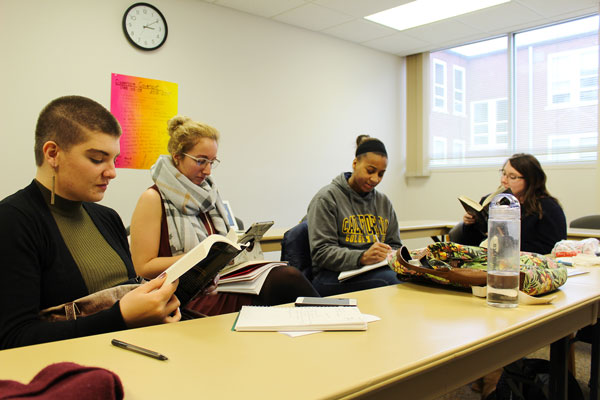This past weekend, 14 students participated in a timely course entitled Conversations on Race, taught by Regina Shands Stoltzfus, professor of peace, justice, and conflict studies. In four sessions over the course of Friday, Saturday and Sunday, students engaged in conversations focused on the history of American racist structures, mass incarceration and white identity, as well as the Black Lives Matter movement.
“Every year the course changes with whatever theme we are having for MLK Day,” Stoltzfus said.The theme for MLK Day events this year was “It Is Time.” Stoltzfus continued, “This year it was harder to pin down, but we focused on mass incarceration and Black Lives Matter this year with the election and presidential change.”
Students were required to read “The New Jim Crow: Mass Incarceration in the Age of Colorblindness” by Michelle Alexander before the class began.
“The biggest thing I took away from the book was the history,” said Ellen Conrad, a senior, “the progression of slavery, to second class citizens, and then felons. Same thing, new label.”
Jesse Loewen, also a senior, said that the statistics were striking.
“I know broad stuff but honing in on statistics and cases was eye-opening because it shows how big the problem is and how we don’t hear about it even though it happens every day.”
When asked about how the course was relevant to life experience, Christi Sessa, a sophomore, said, “I am a middle class white person who lives in a community with very few African-American people and there is a reason for that.”
On the same topic, Loewen said, “For me, because I’m African-American, I know and experience a lot of things that other people don’t. I think my viewpoint helped others in my small group to be like, ‘Oh, this is why he feels this way.’”
As Sarah Thompson reinforced during her convocation speech on Monday, discomfort is often a result of these difficult conversations.
“It is uncomfortable, and it’s part of the process,” Thompson said. “Discomfort is part of what I know will happen and part of my job is to lead people through that in a way that is relatively safe, which is hard, but I think we did accomplish it.”
Malcolm Stovall, a senior, touched on this discomfort. “The most challenging part for me was how Regina really challenged us to engage in a way that wasn’t just a reaction.
To have the ability to step back and have a conversation,” he said. “We are all uncomfortable talking about race, and we need to move beyond that.”
“[Race] is hard to talk about as a white person,” Conrad said. “I was raised in a context with implicit racism, so dealing with that and finding ways to overcome that is difficult.”
Race is a multilayered topic with many perspectives based on the learner’s race, ethnicity, nationality and gender identity. Sessa commented on the intersection of race and LGBTQ+ issues. She pointed out that, “When you look at the number of trans women killed in 2016, I believe most of them were trans women of color.”
How can those who did not take the course gain some of the same experiences and knowledge as these students?
“Read ‘The New Jim Crow,’” Sessa stated emphatically. “If you don’t have time, watch the documentary ‘13th.’”
“Don’t be afraid to ask questions,” Conrad said. “Assume people are experts on their own lives and can tell about their own experiences.”
“If you don’t know much about the history of oppression in America,” Loewen said, “you should take the course. Regardless of your ethnicity, things have happened.”
Backing this up, Stovall emphasized the importance of learning about our national history from the perspective of people of color.
“Our nation is not just made of the Founding Fathers, there are stories that we all have. We have all put in blood, sweat, and tears – some that wasn’t compensated.”
“Systems of oppression really like it when no one talks about it,” Stoltzfus smirked. “I’m a teaching nerd, so I love what I do, but I love it most when people are willing to do their part. I loved this group of students that came, their willingness to just jump in the first night and have this conversation.”
She then paraphrased Sarah Thompson, “We went through it and nobody died.”



